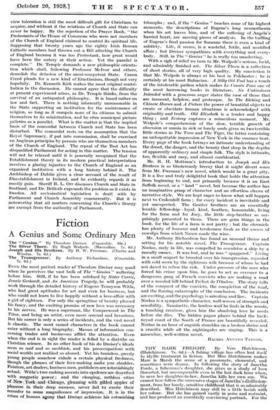F . •
action
A Genius and Some Ordinary Men
Windus. 78. 6d.) The Transgressor. By Anthony R 7s. 6d.)
EVEN the most patient reader of Theodore Dreiser may quail when he perceives the vast bulk of The " Genius " weltering before him. Still, if he has been subdued by Sister Carrie, Jennie Gerhardt, and An American Tragedy, he will probably work through the detailed history of Eugene Tennyson Witla, who had great aptitudes for art and even for business, but who could not learn to live happily without a love-affair with a girl of eighteen. For only the springtime of beauty pleased his fancy, and the exciting promise of new love was necessary to his nerves. He was a superman, like Cowperwood in The Titan, and being an artist, even more sensual and luxurious. But his career is only a series of incidents, and the vast novel is chaotic. The most casual characters in the book cannot enter without a long biography. Masses of information con- cerning trades and businesses afflict the attention. Even when the end is in sight the reader is felled by a diatribe on Christian science. In no other book of his do Dreiser's ideals seem so naif and so snobbish, and his preoccUpations with social worlds not reallie 1 so absurd. Yet his brainless, greedy young people somehow exhale a certain physical. freshness,
though the phrases of their love-making make you shudder. Painters, art dealers, business men, publishers are astonishingly
actual. Witla's two rushing ascents into opulence are described with magnetic power.; and the clanging,. ruthless cities New York and-Chicago, gleaming with gilded _apples of pleasure in their deep recesses, never Sail to .incite their
recorder to some magnificence of impressi9n. . It. is. in the crises of human agony that Dreiser_ achieves _his astonishing
triumphs ; and, if the " Genius " touches none of his highest momenta, the "descriptions of Eugene's long neurasthenia when . his art leaves him, and of the suffering of Angela's harried • heart; are moving pieces of analysis. In the baffling of Eugene's final passion for Suzanne there is even a kind of subtlety. Life, it seems, is a wasteful, futile, and muddled affair ; but Dreiser sympathizes with everything and every- body.. Still, in The " Genius" he is really too unselecting.
With a sigh of relief we turn to Mr. Walpole's serious, lucid, and admirably finished art. The Silver Thorn is a collection of short stories, all of very high quality. My conviction is that Mr. Walpole is always at his best in Polchester ; he is certainly at his most Balzacian. A Silly Old Fool has a touch of the intolerable pathos which makes Le Cousin Pons one of the most harrowing books in literature. No Unkindness Intended with a generous anger states the case of those that are innocent, helpless, and grotesque. In The Etching and Chinese Horses and A Picture the power of beautiful objects to create or elucidate human situations is acknowledged with originality and truth. Old Elizabeth is a tender and happy thing ; and Ecstasy captures a miraculous moment. Mr. Walpole's comprehension of the slow, terrible growth of obsession or mania in sick or lonely souls gives us two terrible little stories in The Tarn and The Tiger, the latter containing an unforgettable impression of New York in the summer heat. Every page of the book betrays an intimate understanding of the dread, the danger, and the beauty that sleep in the depths of apparently ordinary and simple folk. The style is intimate, too, flexible and easy, and ahnost confidential.
Mr. R. H. Mottram's introduction to Joseph and Ilis Brethren is so blusterously breezy that it might divert some from Mr. Freeman's new novel, which would be a great pity. It is a live and truly delightful book that holds the attention from beginning to end, not primarily because it is an East Suffolk novel, or a " land " novel, but because the author has an imaginative grasp of character and an effortless charm of narrative style. We are kept eager to know what will happen next to Crakenhill farm ; for every incident is inevitable and yet unexpected. The Geaiter brothers are an essentially lovable fellowship—loyal, kind, heathen, honourable, living for the farm and for Joey, the little step-brother so sur- prisingly presented to them. There are grim things in the book, for the life of a farm is not pretty ; but the chronicle has plenty of humour and tenderness fresh as the excess of cowslips from which Nance made the wine.
Mr. Anthony Richardson has found an unusual theme and setting for his notable novel, The Transgressor. Captain Norlan, early in life, was compelled to overdrive a ship by a rascally owner. It was lost, and he was " spaggered." Living in a small seaport he brooded over his transgression, regarded with cold scorn by the righteous wife because of whom he had not dared to refuse the risk. Under pressure of the man who forced his crime upon him, he goes to act as overseer to a dangerous gang of French convicts who are making a road over a wooded hill behind Frehut de l'Ombre. The story tells of the conquest of the convicts, the completion of the road, and the flaming catastrophe of the conclusion. The incidents are exciting, and the psychology is arresting and fine. Captain Norlan is a sympathetic character, well-woven of strength and sensibility. Sansinette, the lawless waif he finds in the woods, a touching creature, gives him the absolving love he needs before she dies. The hidden pagan places behind the hack- neyed coast of the South of France are beautifully revealed. Norlan in an hour of anguish stumbles on a broken shrine and a crucifix while all the nightingales are singing. This is a masculine, .well-written novel. _ .
_ _ _ _ RACHEL ANNAND TAYLOR.






























































 Previous page
Previous page